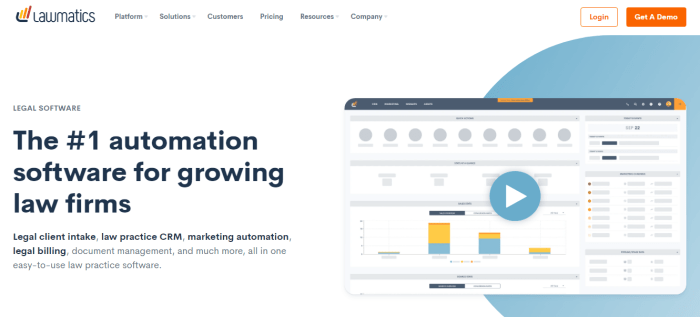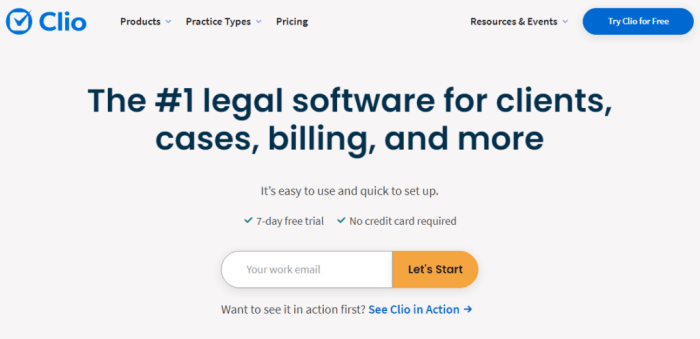Best CRM for law firms is transforming the way legal practices operate, enhancing efficiency and client satisfaction. With the legal industry facing increasing pressures to improve efficiency, the implementation of a robust CRM system can be a game-changer. Studies show that law firms utilizing CRM systems experience significant enhancements in productivity and client management, overcoming the common challenges that arise from outdated practices and disorganized communication.
From streamlined case management to improved client communication, the right CRM solution can provide law firms with essential tools that cater specifically to their needs. As the legal landscape evolves, understanding how to leverage these systems effectively is crucial for success and growth.
Introduction to CRM for Law Firms
Customer Relationship Management (CRM) systems have become a vital tool for law firms seeking to streamline their operations and enhance client interactions. The importance of CRM in legal practices cannot be overstated, as it directly impacts efficiency, organization, and client satisfaction. Studies indicate that law firms implementing CRM systems see a significant boost in productivity, with efficiency improvements of up to 30% reported by firms after adoption. Common challenges faced by law firms lacking a CRM system include disorganized client communications, inefficient case tracking, and difficulty in managing client relationships. These inefficiencies can lead to missed opportunities and decreased client satisfaction.
Key Features of the Best CRM for Law Firms

Law firms should prioritize several essential features when selecting a CRM system that best suits their needs. Key capabilities include:
- Case Management: A robust case management feature allows law firms to organize and track case details, deadlines, and documents efficiently, streamlining workflows and reducing the risk of missed deadlines.
- Client Communication Tools: Effective communication is crucial in the legal sector. A CRM with integrated communication tools fosters better interaction with clients through emails, messages, and updates, thus enhancing client relationships.
- Document Management: The ability to store and manage documents securely within the CRM ensures easy access and sharing among team members and clients, minimizing administrative burdens.
Comparison of Top CRM Solutions for Law Firms

When evaluating CRM solutions, law firms must compare features, pricing, and overall suitability to their specific needs. Below is a comparison table of leading CRM options available for law firms:
| CRM Solution | Key Features | Pricing |
|---|---|---|
| Clio | Case management, billing, client portal | Starting at $39/month |
| MyCase | Client communication, document management | Starting at $39/month |
| PracticePanther | Time tracking, invoicing, reporting | Starting at $49/month |
Each CRM solution has its strengths and weaknesses. For instance, Clio is praised for its comprehensive features but may be considered pricey for solo practitioners. In contrast, MyCase is user-friendly and offers solid client communication tools, making it a favored choice among small to medium-sized firms. Real-life testimonials reveal that firms using PracticePanther appreciate its time management features, which significantly reduce billing discrepancies.
Implementation Process of CRM in Law Firms
Implementing a CRM system in a law firm requires a structured approach to ensure success. The step-by-step process typically involves:
- Assessment of Needs: Identify specific needs and objectives for CRM usage, tailoring the choice to the firm’s operations.
- Selection of CRM: Choose a CRM based on features, scalability, and budget considerations.
- Data Migration: Transfer existing client and case data into the new system accurately.
- Staff Training: Conduct comprehensive training sessions for staff to familiarize them with the new software.
- Monitoring and Feedback: After implementation, monitor usage and gather feedback to make necessary adjustments.
Best practices for training staff include hands-on sessions, creating user manuals, and establishing a support system for ongoing questions. Common pitfalls during implementation may involve inadequate training or resistance to change, which can hinder the adoption of the new system.
Evaluating CRM Performance in Law Firms, Best CRM for law firms
To ensure that a CRM system is working effectively post-implementation, law firms should employ various evaluation methods. Key performance indicators (KPIs) to monitor include:
- Client retention rates
- Time spent on administrative tasks
- Feedback on client communication
Methods for gathering user feedback on CRM usability include surveys, one-on-one interviews, and monitoring user engagement with the platform. This feedback is crucial for continuous improvement and helps in tailoring the system to meet the evolving needs of the law firm.
Future Trends in Legal CRM Systems
The future of CRM technology in law firms is shaped by several emerging trends. Notably, advancements in artificial intelligence (AI) and automation are transforming how legal practices operate. These technologies facilitate:
- Automated task management and reminders, reducing manual workload.
- Enhanced data analytics for better decision-making and client targeting.
- Improved security protocols to protect sensitive client information in compliance with data regulations.
As data security regulations become stricter, CRM systems must evolve to prioritize data protection, ensuring that client confidentiality remains uncompromised.
Customization and Scalability of CRMs for Law Firms

Customization is a crucial aspect of CRM systems, allowing law firms to tailor solutions to their specific practice areas and workflows. Essential customizable features include:
- User interface personalization to enhance user experience.
- Integration with existing tools and software used by the firm.
- Custom reporting options to meet specific metrics or data analysis needs.
Scalability is equally important, especially as law firms expand. A scalable CRM can grow with the firm, accommodating more users and additional features as needed. For example, a small firm may start with basic functionalities and, as it grows, incorporate more advanced case management tools and analytics.
Cost Considerations for Law Firms Choosing a CRM
Understanding the cost implications of implementing a CRM system is vital for law firms. Different pricing models are available, including:
- Subscription-based pricing, which charges a monthly fee based on the number of users.
- One-time licensing fees, requiring an upfront payment for perpetual use.
- Freemium models, providing basic features for free while charging for premium functionalities.
The potential return on investment (ROI) for law firms utilizing a CRM can be significant, with improved efficiency leading to increased billable hours and higher client satisfaction. To budget effectively for CRM implementation, firms should consider both initial costs and ongoing expenses, such as training and support fees.
Outcome Summary: Best CRM For Law Firms
In conclusion, as law firms navigate the complexities of modern legal practice, the importance of selecting the best CRM cannot be overstated. With various solutions available, it’s essential to consider features, scalability, and cost to find a perfect match. By investing in the right CRM system, law firms position themselves not only to enhance operational efficiency but also to foster stronger client relationships, paving the way for future success.